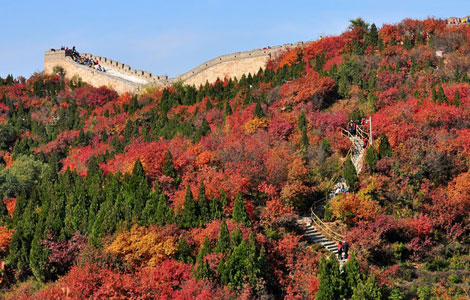Construction project damages famous wetland
Updated: 2013-10-21 10:18
(Xinhua)
|
||||||||
SHIJIAZHUANG - Government authorities have ordered suspension of a building complex construction project after it was accused of having damaged the ecosystem of North China's largest freshwater wetland.
The county government of Anxin had requested the real estate developer to suspend construction and restore the ecology at Baiyangdian Wetland as soon as possible, said a statement released by the Hebei Provincial Government on Sunday at its official account at the twitter-like weibo.com.
The project was not approved by authorities, and shall not resume without legal formalities, said the statement.
The suspension order came after Xinhua received a letter on the illegal activity jointly signed by seven deputies to the National People's Congress (NPC) and later released news reports after verification.
The developer, a private company called Hebei Zhuozheng Group, was exposed to have pumped out lake water of more than 3,000 mu (200 hectares) and destroyed all reeds grown on the area for a tourism resort project, according to the letter.
The 8.5-square-km complex, including a hotel, a club and a Buddhism meditation abode, started in March with total investment of over 3 billion yuan ($492 million), Xinhua has learned.
Located 150 km away from Beijing, Baiyangdian is a wetlandknown for vast areas of reeds. Covering a total area of 9,740 hectares, it is also an important site for migratory birds on the East Asian-Australian flyway.
It comprises of four major lake areas, including Shaochedian in Anxin county, where the project is located.
"With miles of newly-built dike around, I found large pumpers were draining water out and diggers were destroying reeds in July," said Yuan Dabing, a deputy to the NPC.
Xinhua reporters saw at the construction site early this month that a large area of wetland had gone dry. Local villagers said the area used to be a habitat for wild birds and ducks, but these animals had all disappeared after the construction started.
Reeds can purify water quality by absorbing and degrading hazardous substance in water, such as nitrogen and phosphorus. Therefore, eradicating the plants will obviously impact the water quality and threaten the existence of wildlife there, Yuan said.
"The so-called tourism development at the wetland is clearly damaging the ecology here," said Yuan.
Anxin county has 29 lake villages where 110,000 residents live. Following the project, experts believe other developers are likely to follow suit for lucrative reasons, which will further damage local ecology.
Furthermore, water management officials said the project will affect flood water discharge.
"Such projects will block the waterway, and if severe flood happens, the consequence will be destructive," said a water expert who asked not to disclose his name.
 Teacher killed, two wounded in Nevada middle school shooting
Teacher killed, two wounded in Nevada middle school shooting
 Smog wraps northeast, schools forced to close
Smog wraps northeast, schools forced to close
 Architect looks to the big picture
Architect looks to the big picture
 Teachers, students divided over Gaokao reform plan
Teachers, students divided over Gaokao reform plan
 Dogfight looms over jets
Dogfight looms over jets
 Peak season for fall foliage in Beijing
Peak season for fall foliage in Beijing
 Train carrying carrying oil, gas derails in Canada
Train carrying carrying oil, gas derails in Canada
 30,000 turn out in Beijing Marathon
30,000 turn out in Beijing Marathon
Most Viewed
Editor's Picks

|

|

|

|

|

|
Today's Top News
Obama vows to get website fixed
US OKs Alibaba structure
Economy to see 'good ending' in Q4
Teacher killed in Nevada shooting
UK official looks to China
Beijing needs to be 'more active' in global security
Border agreement to boost ties
Rising Chinese demand fuels Australia exports
US Weekly

|

|







